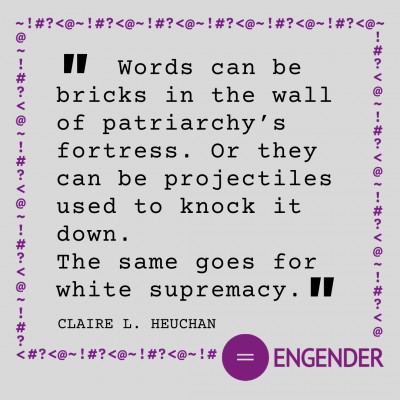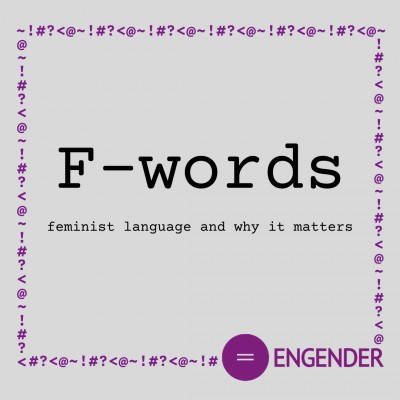Engender blog
F-words: Words against stereotypes
Juliana da Penha is a freelance journalist and founder of Migrant Women Press, an independent media organization about women’s experiences with migration. Here she blogs for us about the stereotyping of migrant women, and the power of words to challenge that. Follow Migrant Women Press on Facebook, Twitter, and Instagram.
-400.png)
What is the first word that comes to your mind when you think about migrant women?
If you are used to the mainstream media coverage about migration, while reading news about this topic, you will probably find the prevalence of some words. What are the implications of these words on the collective understanding of migrant experiences? More importantly, what is the impact of these words on women’s experiences with migration?
It’s a fact, exposed mainly by organizations focused on gender and migration, that the issues migrant women face are underreported. Although many scholars and migration specialists emphasize the phenomenon of “feminization of migration”, migrant women stories are invisible in the mainstream media coverage. Though, when we see news about them, what words are related?
In a quick Google search, I found words like “vulnerable”, “problem”, “difficult”, “exploited”, “crisis”, struggle”.
F-words: Virginity and Foreplay
Jenny Lester is a feminist writer and performer. She currently works at Equate Scotland, and has previously worked in women’s rights organisations and mental health charities. She completed an MA in Women’s Studies researching sex education, pleasure, and faking orgasms. In this 'F-words' blog, she'll be discussing the terms ‘virginity’ and ‘foreplay’ and offering some suggestions for less patriarchal alternatives.
Content Note: this blog contains terminology around anatomy and sexual acts, and one instance of a censored swear-word.
(Losing Your) Virginity
-400.png)
A virgin is something you are, but virginity is something you have. Your virginity is a possession that you save, give, or take. But as a possession, it is strange, because it is a possession of lacking something - that something being sexual experience. Normally understood to be having not had penetrative sex.
F-words: Gypsy/Traveller women in Scotland
-400.png)
Dr Lynne Tammi has worked in the field of Community Development for over three decades. Currently she is the Interim National Co-ordinator for Article 12 in Scotland - a young people-focused human rights and equalities NGO - and a freelance Human Rights Consultant and Advocate. She is of Irish and French Traveller heritage, and writes for us here about the links between language and discrimination.
In considering the language used to categorise and indeed denigrate Gypsy/Traveller women, an examination of the role of the media in the ‘othering’ or cultural denigration and exclusion of the Gypsy/Traveller community en masse is crucial.
Creators of ‘folk devils’ and drivers of moral panics who with “a lexicon of verbal abuse [keep up] a constant level of bigotry” (Cohen, 2002), these virtuosos of meaning-making construct ‘conceptual maps’ - a system, if you like, to code (or de-code) the signs and symbols of who or what are to be assigned the status of 'outsider' - and present them to us as both truth and threat. Consider the following Mail Online (2011) reportage on what was to become the forced eviction of the largest Gypsy/Traveller site in Europe, at the time:
F-words: Language, power, and Blackness

In this first blog in our 'F-words' series, Claire L. Heuchan writes about how the capital 'B' in Black illustrates the link between words and anti-oppression. Claire tweets as SisterOutrider and blogs here.
Since taking my own place in the feminist movement, I’ve given a lot of thought to the relationship between language and power. Words are the markers we use to make sense of the world around us and where we fit in it. The language we choose can uphold social inequalities. Or it can challenge them. There is a connection between words and power, a bond that thrums with potential. Everyday words and phrases can be turned on their head, their meaning subverted.
The earliest example I can remember hearing comes from The Fresh Prince of Bel-Air. The Banks family had gathered round the dinner table for their evening meal. A Christian family, they kicked off dinner by saying grace. And Ashley Banks – Will’s cousin, who brought a much-needed feminist perspective to the series – finished her prayer with ‘a-women’.
F-words: introducing our new blog series on feminist language

Language matters. The words we use, and the contexts in which we use them, come with baggage, preconceptions, cultural implications, and potential for misunderstandings. Used well, language can uplift – bringing nuance to conversations, enabling accuracy in policy discussions, and ensuring that people feel welcome and included. At its worst, language can be used to obfuscate, exclude, and offend.
Downloads
 Engender Briefing: Pension Credit Entitlement Changes
From 15 May 2019, new changes will be introduced which will require couples where one partner has reached state pension age and one has not (‘mixed age couples’) to claim universal credit (UC) instead of Pension Credit.
Engender Briefing: Pension Credit Entitlement Changes
From 15 May 2019, new changes will be introduced which will require couples where one partner has reached state pension age and one has not (‘mixed age couples’) to claim universal credit (UC) instead of Pension Credit.
 Engender Parliamentary Briefing: Condemnation of Misogyny, Racism, Harassment and Sexism
Engender welcomes this Scottish Parliament Debate on Condemnation of Misogyny, Racism, Harassment and Sexism and the opportunity to raise awareness of the ways in which women in Scotland’s inequality contributes to gender-based violence.
Engender Parliamentary Briefing: Condemnation of Misogyny, Racism, Harassment and Sexism
Engender welcomes this Scottish Parliament Debate on Condemnation of Misogyny, Racism, Harassment and Sexism and the opportunity to raise awareness of the ways in which women in Scotland’s inequality contributes to gender-based violence.
 Gender Matters in Social Security: Individual Payments of Universal Credit
A paper calling on the Scottish Government to automatically split payments of Universal Credit between couples, once this power is devolved to the Scottish Parliament.
Gender Matters in Social Security: Individual Payments of Universal Credit
A paper calling on the Scottish Government to automatically split payments of Universal Credit between couples, once this power is devolved to the Scottish Parliament.
 Gender Matters Manifesto: Twenty for 2016
This manifesto sets out measures that, with political will, can be taken over the next parliamentary term in pursuit of these goals.
Gender Matters Manifesto: Twenty for 2016
This manifesto sets out measures that, with political will, can be taken over the next parliamentary term in pursuit of these goals.
 Scottish NGO Briefing for UN Special Rapporteur on Violence Against Women
Joint briefing paper for the UN Rapporteur on Violence Against Women.
Scottish NGO Briefing for UN Special Rapporteur on Violence Against Women
Joint briefing paper for the UN Rapporteur on Violence Against Women.

Newsletter
Sign up to receive our newsletter here:
Sign up to our mailing list
Receive key feminist updates direct to your inbox: